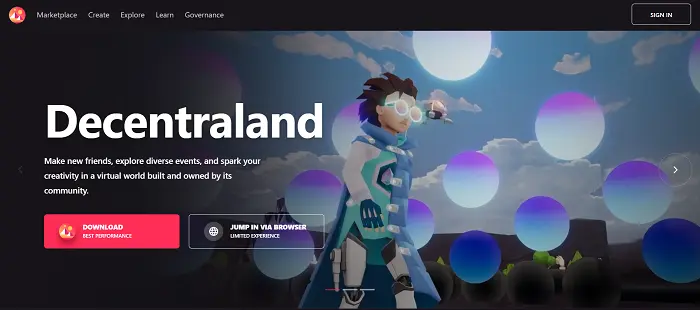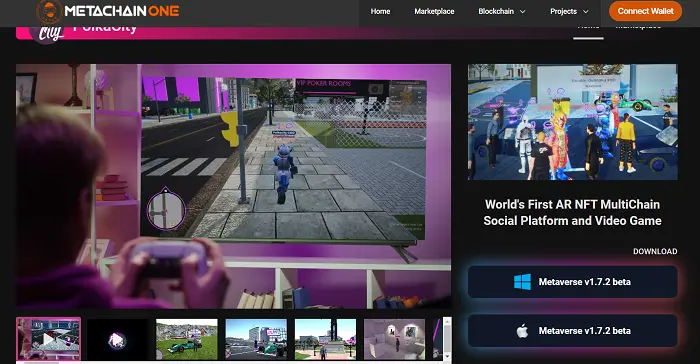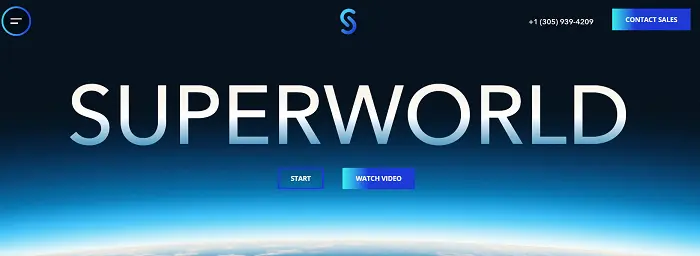What is a real estate NFT marketplace?
A real estate NFT marketplace is a digital platform where property assets are created, bought, sold, and traded in the form of real estate NFTs. These NFTs represent ownership rights, shares, or access to either physical properties (like houses, land, or commercial buildings) or virtual real estate inside metaverse platforms.
In simple terms, a real estate NFT marketplace works like a specialized exchange:
- Creators (property owners or developers) can mint real estate NFTs.
- Investors and buyers can browse listings, verify ownership details on blockhain, and purchase securely without intermediaries.
By tokenizing property into NFTs, these marketplaces make real estate more liquid, transparent, and accessible. They enable everything from fractional ownership of luxury villas to the trading of plots of land in metaverse such as Decentraland or The Sandbox.
Features of real estate NFT marketplace
Property tokenization
The marketplace allows physical real estate assets to be converted into NFTs, either as whole ownership or fractionalized tokens. This feature ensures that even high-value properties can be divided into smaller, affordable investment units.
Smart contrac automation
Smart contracts handle critical processes such as ownership transfer, royalty distribution, rental agreements, and compliance checks. This eliminates intermediaries, reduces human error, and speeds up transactions.
Secure and transparent transactions
Every deal is recorded on the blockchain, ensuring transparency and immutability. Investors can verify the authenticity of a property NFT, previous ownership records, and transaction history before making a purchase.
KYC/AML integration
Since real estate is a highly regulated sector, most marketplaces integrate Know Your Customer (KYC) and Anti-Money Laundering (AML) checks. This ensures compliance with local laws and builds trust among participants.
Fractional ownership support
Investors don’t need to buy an entire property NFT. Fractional ownership allows them to purchase a share of the property, making real estate investments more accessible and liquid.
Secondary market trading
Beyond the initial sale, the marketplace usually provides a secondary market where investors can resell their property NFTs, increasing liquidity and market activity.
Intergration with DeFi services
Some platforms go further by connecting with DeFi solutions, enabling NFT holders to user their property tokens as collateral for loans or to earn passive income throug staking.
User-friendly interface
To attract non-crypto users, a good real estate NFT marketplace provides a simple and intuitive interface, often including fiat payment gateways for easy onboarding.
Top 15 NFT real estate marketplace & projects to watch out for
1. Decentraland
One of the most significant 3D virtual world game initiatives is Decentraland. Players can buy land along with participating and exchanging to increase the ability to earn a lot of money. Numerous investors, including Anderssen, Horowitz, and Union Square Ventures, back it.

With 30,000 monthly users and 18,000 daily users, this developing Decentraland NFT Land Project is active. Additionally, its virtual land has market sales of over $1 million and costs about $17,000 square meters.
Decentraland Mana tokens serve as the game’s transactional currency and payment method. It is generally utilized to pay for real estate as well as services and products that belong to the game.
Players can purchase unique names, wearables, and customized avatars on the Decentraland marketplace with MANA coins.
2. Polka City
Another name to take into consideration is Polka City. Investing in Polka City is significantly easier than other markets. Without opening another blockchain wallet, you can access immediately.

With Polka City, you can make money anywhere. The contract-based assets provided in Polka City will be paid to you. Creating your online presence in this location functions much like creating an actual city. You’ll generate more money by bringing more tourists to your virtual nation.
3. Superworld
You can choose from more than 64 billion plots of virtual real estate in SuperWorld. You can have whatever you want, including historical sites, stadiums, and scrapers. It enables you to locate a piece of real estate unique to you. This will allow you to create a world of your own virtually.

With SuperWorld, you have the opportunity to own a unique piece of land that cannot be replaced digitally. You can also trade them normally like other digital assets. No one else can possess the same digital property as you; it will only be yours. Each plot is a 100 by 100-meter rectangle that is the same size as a Yankee stadium.
4. Cryptovoxels
It feels like entering a completely different reality when one enters the Cryptovoxels virtual world and metaverse. The NFT platform, which was established in 2018, is a virtual space where you can purchase land and create your own tiny planet. This implies that you can modify your voxel pieces of land to develop a game, produce art, or even launch your own company. You can even sell your land to other players in the market if you become weary of it.
The intriguing thing about Cryptovoxels is that you can explore the platform without an Ethereum wallet. You can customize your avatar and have a realistic user experience with day and night cycles, weather, and other factors. You can purchase when you’re ready to buy land on the NFT marketplace, OpenSea.
5. Upland
Upland, a virtual land marketplace, employs real-world locations to map the real estate market. As a result, users can exchange their gained lands for genuine US dollars. Through its in-game companies, Upland also enables players to interact with other gamers to make money and make new friends.
You can make money from real estate in the virtual world similar to the real world, like renting houses, selling them to eat the difference, etc. And Upland is a great platform to help you make a profit.
6. Somnium Space
Somnium Space is a groundbreaking new platform founded in 2017 and released in 2018. It will revolutionize gaming and virtual reality (VR). The business developed an open-source software platform based on the Ethereum Blockchain that enables the purchase and customization of virtual assets like vacant land, parks, and structures.

Users of Somnium Space can now own virtual reality (VR) assets, including avatars and digital commodities. Integrating programmatic advertising plugins that track engagement and conversion rates into the VR games develops a new economy where creators can immediately monetize their work.
7. The Sandbox
The Sandbox is a cutting-edge virtual environment powered by Ethereum blockchain technology. Users can create custom video games from the ground up using commercially available or pre-built building pieces. You must utilize $SAND, the platform’s utility token, and money to purchase real estate and other assets from their marketplace.

Constructing virtual experiences like dioramas and games and placing items like buildings, cars, or furniture gives purchasing land on Sandbox a lot of options. You can create estates on this site if you own land.
8. Omni – PSI
A cutting-edge, ground-breaking new Omni-PSI platform was developed in collaboration with the OMNI Real Estate Group and Passive Income and released last year. It is the first fractional real estate NFT marketplace, allowing sellers and buyers of tokenized property to buy fractionalized assets—assets that are parts of properties rather than complete ones.
Through their NFT marketplace, Omni-PSI collects money through their sales procedure. They buy the lot and rent it out after they hit a hard cap amount particular to the property. According to the number of shares each fractional NFT owner has, they each receive a portion of the rent these renters pay.
9. Fraction
Fraction is a brand-new real estate company operating on the Ethereum blockchain that has obtained the necessary Thai SEC authorization. With its $150 minimum purchase requirement to buy even a portion of an upscale real estate project, the company seeks to increase accessibility for everyone to invest in real estate.
You can invest in a range of assets using Fraction’s plug-and-play platform, from tiny sums to private funds. This has the advantage of showing that the platform was made with your goals and preferences in mind.
10. PROPY
Propy is a one-stop shop for all your real estate needs and is powered by Web3 Technology. They have everything covered, from discovering homes on their thorough list to owning them and even negotiating deals with sellers.
Propy launched its NFT-based real estate exchange platform in the United States in early 2022. The buyer can quickly access the legal paperwork proving property ownership by logging real estate transactions on the blockchain. It is essential to understand that real-world property ownership is not fractional. They will acquire not only a Florida property but also a US-based company holding the same land title.
11. RealT
RealT is a real estate company with properties in the United States, including Chicago, Detroit, and East Cleveland. By doing away with paper deeds, it provides affordable and straightforward investments.
Through their NFTs, known as RealTokens, you can invest in real estate on a fractional basis using the Ethereum network. You can receive weekly rental payments if you own property on this network. Alternatively, you can use their internet portal to pay out your money.
12. Vesta Equity
Vesta Equity is a brand-new Real Estate NFT project that went live in February 2022 on Algorand, one of the world’s leading decentralized blockchain networks.
This is distinctive because investors and property owners can directly engage with one another using the company’s tools and marketplace. The investor receives full residential rights that are entirely retained through the platform once a property is tokenized and negotiations and agreements regarding the percentage of the property are finished. In addition to not making monthly payments, the investor benefits from the property’s appreciation.
13. Atomic Market
You can create your digital assets using AtomicMarket. Through this platform, you can create a property in addition to buying and selling one. The users can place bids and make purchases on these virtual territories based on their preferences.

After that, you can promote them to a big audience. It is a market for dispersed liquidity. In other words, it is simultaneously utilized by several websites. AtomicMarket is easy to navigate and less challenging. A legitimate NFT property will have a validation tick.
This platform has the enormous advantage of allowing the sellers to retain ownership of the asset until it is sold. You are not required to transfer it all at once, unlike other NFT marketplaces. It enables you to keep trading your property until the prior deal is completed.
14. Axie Infinity
On the Ethereum Blockchain, a decentralized game platform called Axie Infinity enables the purchase and exchange of virtual real estate assets.
The cosmos of Axieinfinity is home to many unusual species. To begin the game, players must purchase Axie tokens and stake those tokens to engage in combat, raise armies, gather resources, and create kingdoms.
Because players can employ tactics to own, buy, sell, or exchange resources as an NFT in the Digital Marketplace and stable themselves with recurrent income, Axieinfinity NFT Lands are valued. Axie Infinity is consequently one of the top NFT real estate projects.
The Axieinfinity system’s larger economy enables people to take part on a global scale while also earning money and high-value financial assets in a humorous, enjoyable method.
15. Aavegotchi
One of the best NFT real estate initiatives is Aavegotchi, which offers NFT Lands to holders. In essence, it is a crypto collectible game that uses the Aave system and combines elements of Crypto and Defi.
Aavegotchi avatars are digital collectibles that specify a particular character and a distinguishing trait. The fundamental character features, wearables tied to the avatar, and the kindship score are used to determine Aavegotchi’s score.
The native Aavegotchi token, abbreviated GHST, is utilized for all internal transactions involving purchasing and selling goods. In order to receive more incentives, such as when users trade currency, GHST can also be staked.
Pros and cons of investing in real estate NFTs marketplace
Pros
When investing in properties via NFT real estate marketplaces, you can enjoy several advantages, including:
You have flexibility with real estate NFTs
With an F-NFT or traditional whole NFT, you can put your eggs in your preferred baskets. You also have the freedom to buy, sell, or trade your property anytime you want. This also makes it possible for anyone to invest in property, regardless of wealth or location.
You can do it on your own
You do not need to go through a real estate broker. You can buy, sell, and trade your real estate NFTs directly with other investors.
Expect faster sales transactions
Purchasing NFT properties takes a shorter process with minimal waiting time. That’s because smart contracts used for real estate NFTs automate many methods, making it a very efficient way to buy and sell a property.
Anyone can invest
The advantage of real estate NFTs is that anyone worldwide can purchase an NFT property. This goes against the traditional real estate market that can be exclusive to those who can afford a particular property.
Cons
However, trading on NFT real estate marketplaces also comes with potential downsides, such as:
NFT prices can be volatile
You may not be able to sell your property for as much as you paid to own the property. In the event of a dip in the property value, you may see a different return on your investment than you were hoping for.
You don’t directly own the real-world NFT property
The NFT is not yet formally recognized as an asset under existing legislation. Since physical real estate cannot be directly tokenized, the workaround is for the investor to own the property through a legal entity.
Current laws still do not recognize NFTs as property titles
Since NFTs in real estate are pretty new, many countries still need the proper education regarding real estate tokenization. Your digital purchase of a property as an NFT may still have gray areas in terms of legal ownership, and institutions still need to find a way to catch up on this new technology to change how deeds are recorded.
There are numerous unforeseeable implications to investing in real estate NFT
Virtual real estate NFTs may not be at risk in this respect compared to real-world NFTs. There are undeclared mortgages and unpaid real estate taxes that you may have to deal with after paying for the property. If you do away with performing the standard due diligence when buying real e
How to create a real estate NFT marketplace?
Step 1: Requirement analysis
Business owners searching to create a real estate marketplace should understand the fundamental requirement of the client. From the viewpoint of investors, business partners, traders, NFT experts, and a professional NFT real estate buyer, these requirements can be listed.
Your marketplace will be more successful if it is more personalised. A smart listing and bid interface that can manage the high traffic loads are among the main requirement of a perfect NFT real estate marketplace.
Step 2: Market research
A perfect coupling of multiple technological chances is an NFT in real estate. Blockchain technology is developing and creating new technology trends in the market. To make solutions that desire continuous improvement is now the responsibility of an NFT marketplace development company. Competitor analysis, industry research, magazines, journals, and other informative resources can be valuable for businesses providing NFT marketplace development services. This analysis can help you make highly customized, scalable, and future-oriented NFT solutions.
Step 3: Product discovery
When you know what you want to offer, It is time to examine if your offerings are enough for the market or your targeted users. You can investigate your NFT marketplace potential and main features and end in view in this product discovery phase.
This phase also enables clients to visualize their output in real-time using advanced tools used for prototyping. Not only can the user be visually described, but the user may also gain insights from the consumer in order to provide answers and improve the product’s performance. This procedure is a critical component of the overall procedure. We can create a fair development and management plan based on the product.
Step 4: Design
You can shape your attractive marketplace design that will assist your users in interacting with your product once you have a product structure accessible. You should follow a multilateral product design plan concentrating on the various requirements to make your user-ready product for a versatile audience.
A good design will change your viewers into future customers quickly. A full-featured NFT marketplace will understand the most complex needs in a crowded interface. You will need a capable team of NFT marketplace designers who can use their knowledge of product design, NFT real estate marketplace, and your target customer to emerge an attractive and practical design.
Step 5: UI development
In this phase, the design of an NFT marketplace can be converted into a fully-functional interface. Using the essential framework and programming languages, the features can be coded into the fully-functional interface by the NFT marketplace developers to meet the end objectives. It is preferable to engage UI developers who can materialize a suitable product using project documents and design concepts and who thoroughly understand the NFT market.
You’ll need a set of tech resources to create an NFT real estate marketplace:
Cloud hosting platform
Cloud storage allows all your data to be stored and run on a cloud network instead of a server. This gives you the flexibility to expand as well as limit your operations to create a complete and smooth NFT product.
The cloud infrastructure facilitates automated and controlled solutions and offers suitable APIs, web portals, and mobile applications.
Database management system
A suitable DBMS enables you to make a smart, safe, and secure environment for managing multiple data scopes. The goal is that the reliability and sustainability of data on an NFT real estate marketplace should not be restricted.
Frontend and backend platform
A blockchain development company can use a range of frameworks, programming languages, and scripts to shape an interactive frontend and powerful backend that create a client-oriented NFT marketplace. React.js, Express.js, and Node.js are the major technologies used to develop an NFT real estate marketplace.
A blockchain is used to store NFTs. Implementing Blockchain is essential to guarantee secure and smooth function. Smart Contracts permit the performance of protocols bound within an NFT marketplace. Developers use frameworks such as Drizzle, Ganache, and Truffle to implement Blockchain applications. Multiple NFT marketplaces like Ethereum, Binance Smart Chain, Solana, Cardano, and Polygon are established on Blockchain. Smart Contract will be coded by the developers and deployed into your marketplace.
Step 6: Establishing Blockchain Ecosystem
The objective of establishing a Blockchain Ecosystem is to:
- Guarantee rich functionality
- Stay on track of the process
- Optimize with the product’s futuristic Blockchain goals.
Step 7: Interconnect a crypto wallet
A crypto wallet is one of the most critical requirements of a multi-featured NFT real estate marketplace. It permits the use of crypto coins and provides safe gas fee transmission on both ends. You will need a crypto-suitable wallet that includes features supporting the needs for a Blockchain-allowed NFT marketplace to operate safe and smooth transactions. To create a customized crypto wallet designed for your marketplace, you can also hire a cryptocurrency wallet app development company.
Step 8: Testing
It’s time to examine every minor and significant chained feature, functionality, interface, and even NFTs within the program to be listed on the platform. You examine the development, design, and other elements that go into creating a comprehensive NFT marketplace solution.
Step 9: Deploy
Once you have a product, you make sure to deploy it efficiently and safely on the server. External resources and smart contracts will be integrated into a single package with flexible deployment.
Step 10: Launch
Following design and development, you can launch your NFT real estate marketplace on various channels. There can be a lot of ways to display your product to a large audience, such as potential clients, investors, and partners.
Wrapping up
Physical assets, referred to as “blended” NFTs, can be added to the metaverse’s real estate markets. Expert agents for virtual trading landscapes will be available soon. Future adoption of these NFTs can be anticipated by both tech-savvy and senior consumers alike due to their ease.
In case you are thinking of building your own Real Estate NFT Marketplace, our blockchain team at Synodus.com will provide you with cutting-edge technologies.
More related posts from our blockchain blog you shouldn’t skip:
- Top 15 best art NFT marketplaces designed for artists
- Best 25+ music NFT marketplaces to sell and buy [2025 edition]
- Wine NFT marketplaces: Top 4+ platforms for smart investing
- NFT photography marketplace: All you need to know
- 6+ Fashion NFT Marketplaces Digital Platforms For Fashion Enthusiasts
- NFT jewelry marketplace: An experience or a real investment
- Popular NFT use cases in 8 different industries to follow
How useful was this post?
Click on a star to rate it!
Average rating / 5. Vote count:
No votes so far! Be the first to rate this post.




